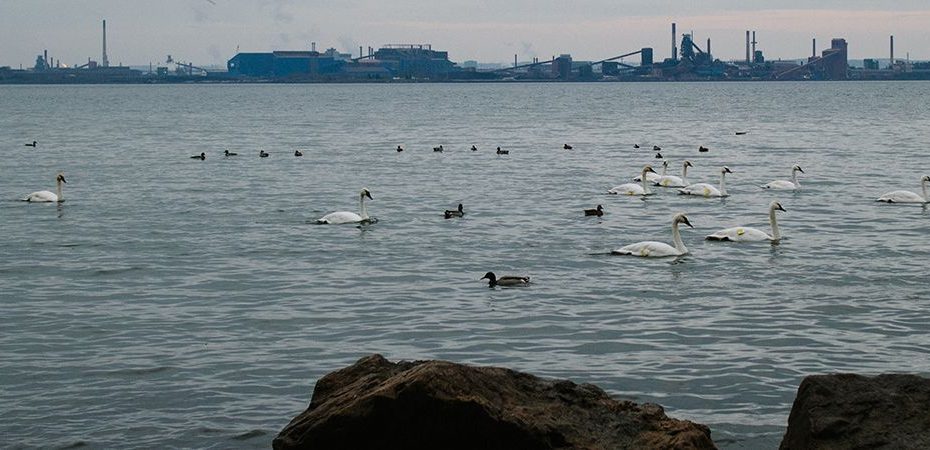In December 2024, the Intergovernmental Platform on Biodiversity and Ecosystem Services (IPBES) released a new assessment report on progress towards halting biodiversity collapse. This latest international report again highlights the urgency of addressing global biodiversity loss and presents a roadmap to drive fundamental, or in this case, transformative societal changes to halt and reverse the decline of nature.
This report is known as the Transformative Change Report and builds on the 2019 global assessment report. The report was approved on December 16, 2024 in Windhoek, Namibia by the IPBES Plenary, which consists of 147 member governments, including Canada. The report defines transformative change as shifts in views – how people think, know and see; structures – how we organize, regulate and govern; and practices – how we act, behave and relate.
Trumpeter swans and waterfowl, LaSalle Park and Marina, Burlington © Ryan McGilchrist CC BY-SA 2.0
This report was prepared over three years by more than 100 leading experts from 42 countries around the world. It offers five strategies to advance transformative change for global sustainability:
Conserve, restore and regenerate places of value to people and nature (e.g., nature restoration can also support cultural values, such as community forest programs)
Drive systematic change and mainstreaming biodiversity in the sectors most responsible for biodiversity loss (e.g., extractive industries supporting regenerative land use)
Transform economic systems for nature and equity (e.g., global subsidies driving nature’s decline are estimated to range from $1.4 trillion to $3.3 trillion per year, while it is estimated that between $722 billion and $967 billion is needed to manage biodiversity and maintain nature’s functions)
Transform governance systems to be inclusive, accountable and adaptive (e.g., integrate biodiversity into all sectors, policies and decision-making)
Shift views and values to recognize human-nature interconnectedness (e.g. by targeting policy measures at desired behaviours, like normalizing the use of reusable containers or educational curricula including content on biodiversity, ecosystem services and nature connectedness at all levels)
Downtown Toronto office buildings © Ken Lund CC BY-SA 2.0
The underlying causes of biodiversity loss identified in the report are the disconnection of people from nature, including an often domination mentality towards the natural world by humanity; inequitable concentration of power and wealth; and prioritization of short-term individual and material gains. This framing is relevant to the variety of environmental challenges we face and demonstrates that the only way to ensure the sustainability of the natural world is to transform the way our societies operate to recognize that humanity is part of and dependent on the well-being of the natural world.
Yet our political and economic systems continue to perpetuate this dangerous cycle, viewing these challenges in isolation, or worse, actually regressing on transformative change (e.g., as we’ve seen in Ontario through the new Provincial Planning Statement or the continued weakening of the Endangered Species Act).
Proposed Bradford Bypass Site
It is exhausting to continue to read report after report regarding the precarious state of the natural world. Scientists have been sounding the alarm bells for decades. The clock is certainly ticking. Repairing humanity’s relationship with the natural world is a necessary imperative. The challenge goes beyond individual actions and will require collective action to drive the necessary political, economic and social changes for a truly sustainable world.
To me, truly transformative change will be a world where conservationists are not considered a “third-party” or a “special interest,” but one where all of humanity recognizes themselves as responsible for conservation of the natural world.
To learn more about the IPBES, visit their homepage.
Resources
The post Transformative Change for Biodiversity Urgently Needed appeared first on Ontario Nature.
